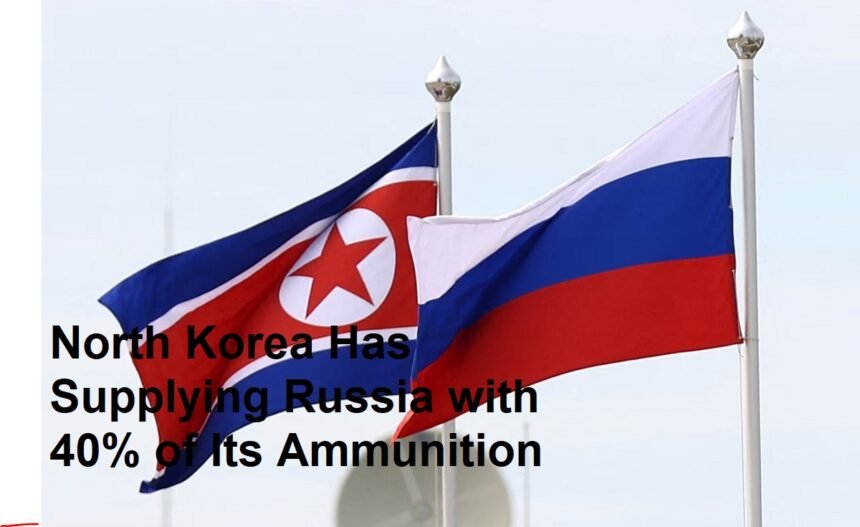Introduction
In recent years, global geopolitical tensions have intensified, especially amidst the ongoing conflict in Ukraine. One of the less publicly discussed yet critically significant aspects of this situation is the military support from North Korea to Russia. According to various intelligence sources and analysts, North Korea has been supplying Russia with approximately 40% of its ammunition. This development marks a notable shift in the dynamics of international support and military logistics amidst the ongoing conflict.
The Context of North Korea and Russia Relations
Historically, North Korea and Russia (and the former Soviet Union) share a complex relationship marked by periods of alliance and tension. During the Cold War, North Korea was heavily supported by the Soviet Union, which supplied military aid and economic assistance. Despite international sanctions and North Korea’s isolated status, the two nations maintained some level of diplomatic and military cooperation.
In recent years, global sanctions on North Korea due to its nuclear ambitions have isolated Pyongyang from much of the international community. However, North Korea’s willingness to engage in clandestine activities has persisted, especially in support of Russia’s strategic interests.
Evidence of Ammunition Supply
Recent intelligence reports suggest that North Korea has been secretly supplying Russia with a significant quantity of ammunition, including artillery shells, missiles, and small arms. Estimates indicate that North Korea may be contributing as much as 40% of Russia’s ammunition needs for current operations.
Satellite images, intercepted communications, and defector testimonies support these claims, indicating a clandestine supply chain that transfers weapons and munitions across regional borders. North Korea’s production facilities, which historically manufacture large quantities of weapons and munitions, have been reportedly ramped up to meet the rising demand.
Why North Korea Supplies Russia
There are multiple strategic and economic reasons behind North Korea’s support for Russia:
- Economic Compensation: Although international sanctions restrict trade, North Korea has increasingly relied on illicit channels to earn hard currency. Supplying arms and ammunition to Russia has become an unconventional way for Pyongyang to generate revenue.
- Political Alliance: North Korea’s support aligns with its broader strategy to strengthen alliances with major powers that oppose Western influence. Russia, which faces sanctions and diplomatic isolation from the West, has become a natural partner.
- Military Collaboration: The exchange of military technology and equipment often accompanies ammunition supply. North Korea benefits from gaining advanced military tactics, technology, and global leverage by collaborating with Russia.
Implications for Global Security
The involvement of North Korea in supplying ammunition to Russia complicates the international response to the Ukraine conflict and regional stability. It raises concerns about proliferation of weapons, bypassing sanctions, and unchecked arms smuggling.
Furthermore, North Korea’s role underscores its defiance of international sanctions and shows how it continues to leverage clandestine networks to sustain its economy. This support not only prolongs the conflict in Ukraine but also destabilizes the broader security environment in Eurasia and beyond.
International Reactions
The international community, particularly Western nations and NATO, has expressed concern over North Korea’s involvement in supporting Russia’s military efforts. Countries like the United States and South Korea have increased intelligence-sharing and coordination to monitor covert arms transfers.
UN sanctions authorities have also launched investigations into North Korea’s clandestine arms trade activities. However, enforcement remains challenging due to North Korea’s expertise in clandestine operations and the difficulty in verifying clandestine shipments.
Possible Future Developments
The dynamic of North Korea supplying Russia could evolve further, especially if conflict intensifies or if new sanctions are imposed. Both countries have incentives to deepen their military cooperation, which could include technology exchanges, joint exercises, or expanded weapons shipments.
Additionally, this relationship may encourage other sanctioned or isolated countries to follow suit, creating a more fragmented and complex global arms market.
Conclusion
The claim that North Korea supplies Russia with about 40% of its ammunition highlights the evolving nature of international military support and clandestine alliances. While officially isolated, North Korea continues to assert influence and leverage its military capabilities to support allies like Russia. This support deepens existing geopolitical tensions and poses challenges for global security, emphasizing the importance of international vigilance and strengthened sanctions enforcement.
As the conflict in Ukraine rages on, the role of North Korea remains a critical yet covert element in the broader security landscape—one that could shape future international responses and strategies.












